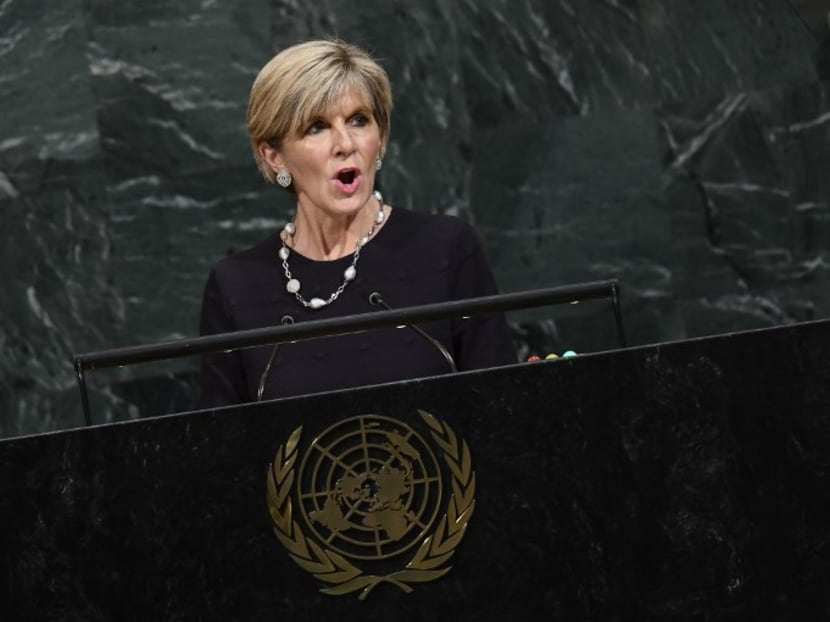Australia dismisses Chinese criticism of Canberra’s new foreign policy white paper
CANBERRA — Australian Foreign Affairs Minister Julie Bishop has dismissed criticism from China about Canberra’s new foreign policy white paper, saying that Chinese ambassador Cheng Jingyue is very positive about bilateral ties.
CANBERRA — Australian Foreign Affairs Minister Julie Bishop has dismissed criticism from China about Canberra’s new foreign policy white paper, saying that Chinese ambassador Cheng Jingyue is very positive about bilateral ties.
Ms Bishop said she met Mr Cheng on Thursday (Nov 23) evening, adding that senior Chinese government officials “respect the stand we have taken in the white paper”, The Guardian reported.
China had urged Australia on Thursday to refrain from making “irresponsible remarks” after Canberra issued on the same day a foreign policy paper citing security risks in the disputed South China Sea caused by Beijing's activities there.
“Australia is not a party directly concerned in the South China Sea issue, and it has made clear many times that it does not take sides,” spokesman Lu Kang said. “We hope the Australian side will honour its commitment and stop making irresponsible remarks.”
Ms Bishop declined to engage with Mr Lu’s remarks when she spoke on ABC radio on Friday (Nov 24).
“The Chinese foreign ministry said that our description of the relationship with China was objective,” she said.
“Last evening I met with the Chinese ambassador Cheng and he was very positive about the Australian-China relationship,” she added.
An editorial in the state-run Global Times is also critical of Australia’s new foreign policy white paper, dismissing it as a country that is “not that important”, adding it is economically dependent on China but shows “little gratitude” towards Beijing.
“Yet, criticism of China from Australian officials and biased reporting against China in Australia’s media continues,” the editorial noted.
“Australia is difficult to be reasoned with or be comforted. Fortunately, the country is not that important and China can move its ties with Australia to a back seat and disregard its sensitivities.”
Responding to the Global Times article, Ms Bishop stressed that the negative media coverage of the white paper had come from a Communist Party-run tabloid.
“The feedback that I have had from senior Chinese officials is that they respect the stand we have taken in the white paper,” she was quoted as saying by The Guardian.
Earlier on Thursday, Australia released its first detailed policy document in 14 years on its national interests and diplomacy.
It said Australia is “particularly concerned by the unprecedented pace and scale of China's activities” in the South China Sea.
China claims virtually the entire South China Sea, pitting it against Taiwan and four South-east Asian nations with overlapping claims in the waterway, which straddles busy international sea lanes and potentially has vast undersea deposits of oil and gas.
The United States and others have accused Beijing of further militarizing the region and altering geography to bolster its claims. China says the seven islands it constructed on reefs and outcrops in the Spratly chain, which are equipped with airstrips and military installations, are mainly for civilian purposes and to boost safety for fishing and maritime trade.
“Australia opposes the use of disputed features and artificial structures in the South China Sea for military purposes,” the foreign policy white paper said. AGENCIES







